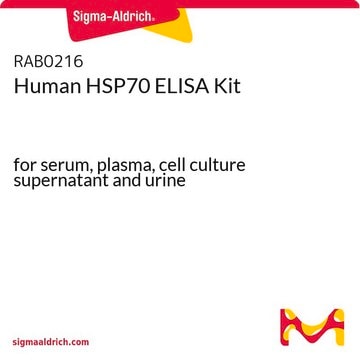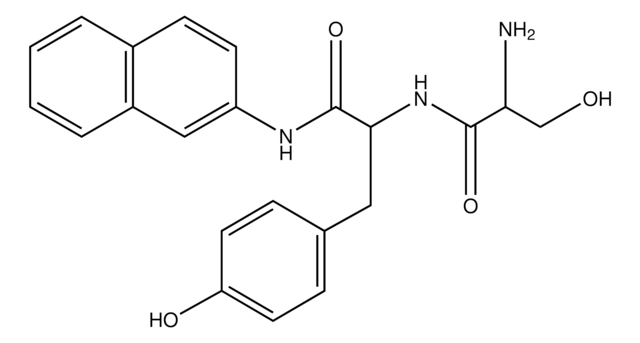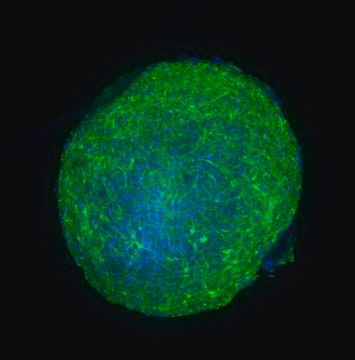Wichtige Dokumente
H0273
Monoclonal Anti-Heat Shock Protein 25 antibody produced in mouse
clone IAP-28, ascites fluid
About This Item
Empfohlene Produkte
Biologische Quelle
mouse
Qualitätsniveau
Konjugat
unconjugated
Antikörperform
ascites fluid
Antikörper-Produkttyp
primary antibodies
Klon
IAP-28, monoclonal
Mol-Gew.
antigen 25 kDa
Enthält
15 mM sodium azide
Speziesreaktivität
chicken, bovine, frog, rabbit, guinea pig, turkey, Drosophila, mouse, rat, human
Methode(n)
immunohistochemistry: suitable using frozen sections of chicken gizzard smooth muscle
indirect ELISA: suitable
indirect immunofluorescence: suitable using formalin-fixed, heat-shocked cultured chick embryo fibroblasts
radioimmunoassay: suitable
western blot: 1:500 using turkey gizzard extract
Isotyp
IgG1
UniProt-Hinterlegungsnummer
Versandbedingung
dry ice
Lagertemp.
−20°C
Posttranslationale Modifikation Target
unmodified
Angaben zum Gen
human ... HSPB1(3315)
mouse ... Hspb1(15507)
rat ... Hspb1(24471)
Verwandte Kategorien
Allgemeine Beschreibung
Spezifität
Immunogen
Anwendung
- immunoblotting
- enzyme linked immunosorbent assay (ELISA)
- radioimmunoassay (RIA)
- immunocytochemistry
- immunohistofluorescence assay
- immunopurification
Biochem./physiol. Wirkung
Physikalische Form
Lagerung und Haltbarkeit
Haftungsausschluss
Sie haben nicht das passende Produkt gefunden?
Probieren Sie unser Produkt-Auswahlhilfe. aus.
Lagerklassenschlüssel
10 - Combustible liquids
WGK
nwg
Flammpunkt (°F)
Not applicable
Flammpunkt (°C)
Not applicable
Hier finden Sie alle aktuellen Versionen:
Analysenzertifikate (COA)
Die passende Version wird nicht angezeigt?
Wenn Sie eine bestimmte Version benötigen, können Sie anhand der Lot- oder Chargennummer nach einem spezifischen Zertifikat suchen.
Besitzen Sie dieses Produkt bereits?
In der Dokumentenbibliothek finden Sie die Dokumentation zu den Produkten, die Sie kürzlich erworben haben.
Unser Team von Wissenschaftlern verfügt über Erfahrung in allen Forschungsbereichen einschließlich Life Science, Materialwissenschaften, chemischer Synthese, Chromatographie, Analytik und vielen mehr..
Setzen Sie sich mit dem technischen Dienst in Verbindung.








